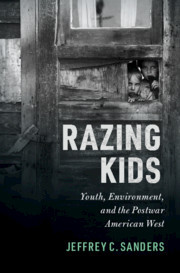Description
Razing Kids
Youth, Environment, and the Postwar American West
Author: Sanders Jeffrey C.
Analyzes the relationship between the postwar demographic explosion of youth and the emergence of environmentalism in the rapidly changing American West.
Language: English
Subject for Razing Kids:
Approximative price 31.58 €
In Print (Delivery period: 14 days).
Add to cart
Razing Kids
Publication date: 12-2020
256 p. · 15.3x23 cm · Paperback
Publication date: 12-2020
256 p. · 15.3x23 cm · Paperback
Approximative price 101.56 €
In Print (Delivery period: 14 days).
Add to cart
Razing Kids
Publication date: 12-2020
256 p. · 23x15 cm · Hardback
Publication date: 12-2020
256 p. · 23x15 cm · Hardback
Description
/li>Contents
/li>Biography
/li>
Children are the future. Or so we like to tell ourselves. In the wake of the Second World War, Americans took this notion to heart. Confronted by both unprecedented risks and unprecedented opportunities, they elevated and perhaps exaggerated the significance of children for the survival of the human race. Razing Kids analyzes the relationship between the postwar demographic explosion and the birth of postwar ecology. In the American West, especially, workers, policymakers, and reformers interwove hopes for youth, environment, and the future. They linked their anxieties over children to their fears of environmental risk as they debated the architecture of wartime playgrounds, planned housing developments and the impact of radioactive particles released from distant hinterlands. They obsessed over how riot-riddled cities, War on Poverty era rural work camps and pesticide-laden agricultural valleys would affect children. Nervous about the world they were making, their hopes and fears reshaped postwar debates about what constituted the social and environmental good.
Introduction. Bulldozer in the playground; 1. 'They build strong children with well bodies': building child-centered landscapes; 2. 'From bomb to bone': youth bodies and postwar ecology; 3. 'Saving trees, land, and boys': juveniles, nature, and the carceral state; 4. In loco parentis: runaways and 'the right to the city'; 5. 'Save the family farm': child labor, pesticides, and green consumerism; Epilogue: Kids today.
Jeffrey C. Sanders is Associate Professor in the Department of History, Washington State University. He is the author of Seattle and the Roots of Urban Sustainability: Inventing Ecotopia (2010).
© 2024 LAVOISIER S.A.S.




